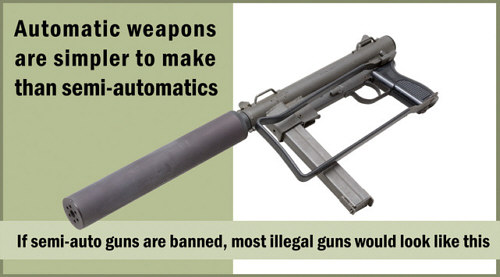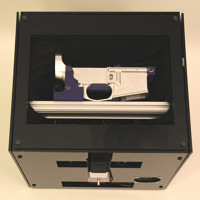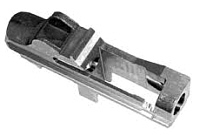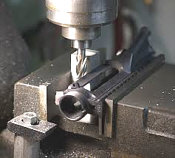

New ATF Ruling on Privately Made Guns
Defies Constitution, Logic, and English
![]()
By Kurt Hofmann, January 7th 2015, 2014
JPFO writer contributor, © 2014.

Picture, Oleg Volk
 Monday, JPFO contributor and National Gun Rights Examiner David Codrea noted that in its first ruling of the new year, the Bureau of Alcohol, Tobacco, Firearms and Explosives (BATFE) has determined that a business, merely by making its machining equipment available for a fee, to individuals to use in building a firearm, has now "manufactured" the gun, and must meet all the requirements imposed on commercial gun manufacturers. This includes a gun manufacturer's license from the BATFE, the marking of the firearm (or receiver, which for legal purposes is the firearm) with a serial number, manufacturers' record keeping, and conducting a background check on the person who actually did the work in making the gun.
Monday, JPFO contributor and National Gun Rights Examiner David Codrea noted that in its first ruling of the new year, the Bureau of Alcohol, Tobacco, Firearms and Explosives (BATFE) has determined that a business, merely by making its machining equipment available for a fee, to individuals to use in building a firearm, has now "manufactured" the gun, and must meet all the requirements imposed on commercial gun manufacturers. This includes a gun manufacturer's license from the BATFE, the marking of the firearm (or receiver, which for legal purposes is the firearm) with a serial number, manufacturers' record keeping, and conducting a background check on the person who actually did the work in making the gun.
This, although heinous, should not have been unexpected. The BATFE had asserted such a position, if only informally, almost two years ago. Again from David Codrea:
. . . an April 12, 2013 letter from Debra S. Satowiak, Chief, Firearms and Explosives Industry Division, to Jason Davis, attorney for Ares Armor Metal Works, LLC, advised that a Federal Firearms License is required for “a business premises at which, for a fee, it makes available a computer numeric control (CNC) machine, tools, equipment, and instructions to persons who bring in castings or raw materials for the purpose of creating firearms.”
This, of course, raises a good many questions. Attorney Joshua Prince asks one:
“Can a company offer membership, whereby any member is entitled to utilize the company equipment for free, and the member complete his/her/its firearm on the company equipment since the business would not be engage in the business?” he asks. “Do machine shops now need to inquire of the individual as to what he/she/it is going to be utilizing the machinery for?”
 If you own one of Defense Distributed's "Ghost Gunner" firearm-optimized CNC milling machines, and a buddy wanting to complete his "80% complete" AR-15 receiver offers to bring a pizza in exchange for use of the machine, would you become an "unlicensed gun manufacturer" (and a gun trafficker) if you agreed?
If you own one of Defense Distributed's "Ghost Gunner" firearm-optimized CNC milling machines, and a buddy wanting to complete his "80% complete" AR-15 receiver offers to bring a pizza in exchange for use of the machine, would you become an "unlicensed gun manufacturer" (and a gun trafficker) if you agreed?
For that matter, if renting out access to one's machining equipment, which is then used to manufacture a gun, is to be considered "being in the business of" manufacturing firearms, how is selling the equipment any different?
 Incredibly, the rampant illogic gets worse. Ares Armor, a company that manufactures "80% complete" AR-15 receivers (some polymer, and some aluminum), and has been doing battle with the BATFE for nearly a year now, took to their Facebook page to amusingly summarize perhaps the most ridiculous aspect of the new ruling (warning: mild profanity in the link):
Incredibly, the rampant illogic gets worse. Ares Armor, a company that manufactures "80% complete" AR-15 receivers (some polymer, and some aluminum), and has been doing battle with the BATFE for nearly a year now, took to their Facebook page to amusingly summarize perhaps the most ridiculous aspect of the new ruling (warning: mild profanity in the link):
Question 1: So an 80% lower is not a firearm...
ATF Answer: Correct
![]()
Question 2: So if I drill a single hole in the fire-control pocket of an 80% lower then it is a firearm...
ATF Answer: Correct
![]()
Question 3: Ok then... If an 80% lower with one hole drilled in the FCP is a firearm... can I then take the firearm that I made at home to an FFL and have him complete the rest of the work because he isn't manufacturing the firearm, he is just "gunsmithing" the firearm... I already manufactured the firearm by drilling the hole so it should be no problem right...
ATF Answer: Oh Crap!!!!!!!! ummmmm... Let me get back to you on that. No that can't be right... There is no way you can do that... That is not fair! you cheated!
What this is about is that the BATFE has previously ruled that by drilling a single hole in the fire control cavity of an 80% complete receiver, or even making the material that should be removed a different color, so that the home gun maker can more easily see what must be done to make the receiver usable, the 80% complete receiver is not just an 80% complete receiver, and is instead a full-blown firearm (well, firearm receiver, which amounts to the same thing by law).
 This became a problem for them when people realized that they could buy an 80% receiver, drill a single hole in the fire control cavity themselves, thus making the receiver "complete" in the BATFE's eyes, even though considerably more machining would be required to make the receiver usable in a functional firearm. That, in turn, means that if now the owner of the "gun" turns it over to a gunsmith with the right machining equipment, the gunsmith could do the rest of the machining, and it wouldn't be "manufacturing" a gun (which, after all," has already been "manufactured), but merely "gunsmithing" (modifying, repairing, etc.), requiring no serial number, no background check, etc.
This became a problem for them when people realized that they could buy an 80% receiver, drill a single hole in the fire control cavity themselves, thus making the receiver "complete" in the BATFE's eyes, even though considerably more machining would be required to make the receiver usable in a functional firearm. That, in turn, means that if now the owner of the "gun" turns it over to a gunsmith with the right machining equipment, the gunsmith could do the rest of the machining, and it wouldn't be "manufacturing" a gun (which, after all," has already been "manufactured), but merely "gunsmithing" (modifying, repairing, etc.), requiring no serial number, no background check, etc.
This, of course, could not be borne. So part of this new ruling fabricates a new, artificial distinction in gunsmithing.
ATF Ruling 2010-10 does recognize that gunsmiths may improve firearms by participating in the manufacturing process. However, none of the enumerated processes (i.e., repairing, modifying,embellishing, refurbishing, installing parts, or specialized finishing) actually create a frame or receiver, or make an existing frame or receiver suitable for use in assembling a “weapon” capable of expelling a projectile.
![]()
This is consistent with the traditional services that gunsmiths offer. Generally, licensed gunsmiths perform actions in repairing or improving firearms that are already complete weapons, or capable of being assembled as such. Gunsmiths do not perform the machining or other manufacturing processes to create frames or receivers, or make them suitable for use in assembling a weapon that can expel a projectile.
 So now, any gunsmith or machinist who is hired by the "gun" owner to complete the machining is going to be ruled to have "manufactured" a gun, and will thus be held to the same restrictions that apply to all commercial gun manufacturers. The BATFE is insisting on having its cake and eating it, too. They have previously argued that an 80% receiver ceases to be an 80% receiver, and becomes a "firearm," if the manufacturer does so much as scratch an outline showing where material needs to be milled away; but now, if the buyer of what the BATFE recognizes as an incomplete receiver similarly removes some of the material that must be removed in order to make the receiver function in a firearm, and then turns it over to a skilled professional gunsmith or machinist to finish the work, the professional ends up being considered the one to have "manufactured" the gun.
So now, any gunsmith or machinist who is hired by the "gun" owner to complete the machining is going to be ruled to have "manufactured" a gun, and will thus be held to the same restrictions that apply to all commercial gun manufacturers. The BATFE is insisting on having its cake and eating it, too. They have previously argued that an 80% receiver ceases to be an 80% receiver, and becomes a "firearm," if the manufacturer does so much as scratch an outline showing where material needs to be milled away; but now, if the buyer of what the BATFE recognizes as an incomplete receiver similarly removes some of the material that must be removed in order to make the receiver function in a firearm, and then turns it over to a skilled professional gunsmith or machinist to finish the work, the professional ends up being considered the one to have "manufactured" the gun.
We're incessantly told about the dangers of failing to keep firearms out of the hands of the mentally incompetent. How much more dangerous, though, is it to hand guns, badges, and the power to formulate gun policy (no legislation needed!) to such people?
 A former paratrooper, Kurt Hofmann was paralyzed in a car accident in 2002. The helplessness inherent to confinement to a wheelchair prompted him to explore armed self-defense, only to discover that Illinois denies that right, inspiring him to become active in gun rights advocacy. He also writes the St. Louis Gun Rights Examiner column. Kurt Hofmann Archive.
A former paratrooper, Kurt Hofmann was paralyzed in a car accident in 2002. The helplessness inherent to confinement to a wheelchair prompted him to explore armed self-defense, only to discover that Illinois denies that right, inspiring him to become active in gun rights advocacy. He also writes the St. Louis Gun Rights Examiner column. Kurt Hofmann Archive.
![]()




































